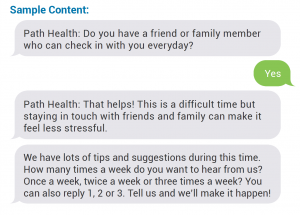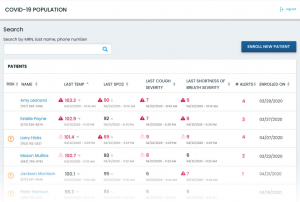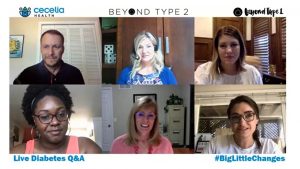
SJF Digital Health Companies Respond Rapidly to COVID-19
mPulse Mobile, Validic, and Cecelia Health each offer unique solutions to protect and help patientsThe COVID-19 pandemic has upended daily lives, communities, and businesses around the world. Many of SJF Ventures’ portfolio companies saw the pandemic as a call to action to improve the welfare and health of their employees and key stakeholders. SJF’s healthcare portfolio companies, in particular, acted quickly to respond to COVID-19, building upon their ongoing impacts to patient and health plan member populations. mPulse Mobile, Validic, and Cecelia Health provide three prime case studies of digital health rapid response and positive impacts in the face of COVID-19.
mPulse Mobile aims to increase patient engagement and improve communication through meaningful, interactive dialogue, primarily through text messaging. When the pandemic hit the U.S. during the first quarter of 2020, mPulse acted swiftly and launched over 200 COVID-related programs across its mobile channels. These programs include:
- Core and Alert Messaging, keeping populations informed with accurate information to raise awareness and utilization of efficient care resources,
- Telehealth Access and Engagement, to drive awareness and utilization of telehealth services for COVID-19 related consultations,
- Mail Order Pharmacy Messaging, Fotonovelas offered in both English and Spanish, and
- Social Isolation programs designed to engage, motivate, and open communication channels to fight against loneliness, depression, and anxiety from isolation.
mPulse has engaged in nearly 40 million coronavirus-related conversations with healthcare consumers since the pandemic started. Overall, opt-out rates for these new COVID-19 programs have proven extremely low – 0.8%, which is one-fifth of average opt-out rates in normal circumstances – and have remained low across social determinants of health (SDOH) bands. While COVID-19 program engagement rates were overall higher than average, particularly for interactive messages, members with greater SDOH barriers were also equally or more likely to engage in interactive messaging. mPulse’s conversational AI helped members navigate resources and answer questions related to virus-specific issues (39% of unstructured responses), as well as on additional topics like food and job security (53%).
In Cook County in Illinois, particularly hard-hit by COVID-19, mPulse sent over 2.5 million COVID-related text messages to more than 319,000 Medicaid plan members. mPulse provided links to information and resources to aid communities seeking support and sought to build health literacy around the virus. 11.5% of recipients clicked on information links or responded to messages, and here, too, members with greater SDOH barriers were more likely to engage. mPulse’s fotonovela products were key to driving that engagement and the company saw 15% engagement overall. Among Spanish speakers in particular, mPulse saw 35% engagement.
Overall, the healthcare engagement and communication that mPulse Mobile was able to generate, particularly in SDOH populations, suggests strong potential for plans to be a source of support for unmet social needs and that culturally-relevant communications, like mPulse’s fotonovelas, can positively impact health disparities.
Validic, the healthcare industry’s leading technology platform for convenient, easy data access to mobile health and in-home devices, wearables, and health applications, helps healthcare companies better coordinate care across communities. Validic saw an immediate need for its patient monitoring solution to triage symptoms and improve outcomes for COVID-19 patients. In response, Validic launched a real-time monitoring solution designed to observe, analyze, and triage individuals remotely. Validic’s COVID-19 Home Monitoring system tracks a patient’s body temperature, oxygen saturation, cough frequency, heart rate, breathing difficulty, and exposure, enabling real-time analysis and escalation of critical health data to care management and human resource teams.
One use case for Validic’s COVID-19 Home Monitoring System is for health systems looking to effectively treat patients while increasing resource allocation. Kaiser Permanente’s Home First Team launched a symptom monitoring program in the Mid-Atlantic to track high-risk patients. The over 1,300 patients enrolled in the program were sent a pulse oximeter and asked to submit their body temperature, oxygen saturation, breathing difficulty, and cough frequency twice per day. Alerts were sent to physicians when a patient reading fell outside of the threshold. Physicians credit the program with saving lives as alerts were able to catch patient declines and taught physicians about SPO2 trends related to COVID-19, offering insight on the natural progression of the virus.
Validic’s solution has also proven valuable to essential industry employers seeking to keep employees safe while working during the pandemic. Weaver Street Market, a four-store natural food co-op in North Carolina, has remained open throughout the pandemic. To help keep its 300 employees safe, Weaver Street Market used Validic’s COVID-19 Home Monitoring System to monitor its employees. The program was launched within days, and the HR team continues to utilize it to manage, enroll, review, and triage employees. So far, Weaver Street Market has not reported any COVID-19 cases.
Cecelia Health transforms the lives of people living with diabetes and other chronic conditions through their technology-enabled personalized expert coaching solution. Realizing that those living with chronic diseases, like diabetes, are at higher risk of complications from the novel coronavirus, Cecelia Health has taken steps to ensure its patient population is not only well-informed on COVID-19 risks, but that it also receives uninterrupted access to quality diabetes and other chronic condition care on behalf of its payer, pharma and medical device, and self-insured employer customers.
“For many patients, our coaches were the only care-support option they could access for months,” noted Teresa McArthur, VP of Clinical Services at Cecelia Health. Its direct mail and digital communication efforts resulted in a lift in 90-day prescriptions across programs, a 20% increase in coaching connection rates, and a 27% update in enrollment across Cecelia Health’s pharma programs.
The increase in overall engagement achieved by Cecelia Health is likely to drive stronger medication adherence among its patient population and thus, deeper impact. Additionally, continued adoption of telemedicine to treat diabetes will increase access to care, optimizing health outcomes.
Cecelia Heath is also providing telehealth support to diabetes specialty clinics nationwide, including the Joslin Diabetes Center at SUNY Upstate Medical University in Syracuse, New York. The Cecelia team is assisting both patients and clinicians with providing a spectrum of support in managing their insulin-dependent diabetes to ease the daily burden and help improve outcomes. Cecelia Health’s telehealth model has been a critical element for providing diabetes patients with access to care at time when COVID-19 has prevented them from coming into the clinics to meet with endocrinologists and other clinical staff.
Later this year, Cecelia Health will launch the first of its kind commercial Virtual Diabetes and Mental Health Clinic that will offer continuous glucose monitoring training, education on medication adherence and lifestyle and behavior change, mental health screening and counseling, all supported by algorithms that will recommend necessary dosage and titration changes that will be reviewed and approved by Cecelia Health’s Certified Diabetes Care and Education Specialists and Endocrinologists.
SJF Ventures is proud of its companies’ responses to the huge challenges of COVID-19 and applauds the efforts and results of its healthcare companies specifically, including mPulse Mobile, Validic, and Cecelia Health, to fight the pandemic.
A special thanks to SJF Venture Fellow Michelle Moglia for her contributions to this case study in 2020.


